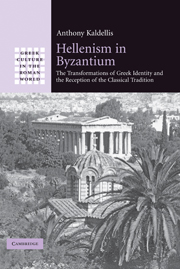 Hellenism in Byzantium
Hellenism in Byzantium Book contents
- Frontmatter
- Contents
- Preface
- Introduction
- PART I GREEKS, ROMANS, AND CHRISTIANS IN LATE ANTIQUITY
- 1 “We too are Greeks!”: the legacies of Hellenism
- 2 “The world a city”: Romans of the East
- 3 “Nibbling on Greek learning”: the Christian predicament
- Interlude: Hellenism in limbo: the middle years (400–1040)
- PART II HELLENIC REVIVALS IN BYZANTIUM
- General conclusions
- Bibliography
- Index
3 - “Nibbling on Greek learning”: the Christian predicament
Published online by Cambridge University Press: 24 December 2009
- Frontmatter
- Contents
- Preface
- Introduction
- PART I GREEKS, ROMANS, AND CHRISTIANS IN LATE ANTIQUITY
- 1 “We too are Greeks!”: the legacies of Hellenism
- 2 “The world a city”: Romans of the East
- 3 “Nibbling on Greek learning”: the Christian predicament
- Interlude: Hellenism in limbo: the middle years (400–1040)
- PART II HELLENIC REVIVALS IN BYZANTIUM
- General conclusions
- Bibliography
- Index
Summary
The encounter between ancient Hellenism and Christianity in all of their forms has been one of the main coordinates of the evolution of “western” culture, and Byzantium was perhaps the most quintessentially western culture in this regard. The complexity and philosophical scope of this theme preemptively defeat any attempt to offer a comprehensive or theoretically innovative analysis. Beyond the difficulty of defining the two protagonists, the theme involves a vast amount of material, requires expertise in many disciplines, and raises philosophical issues that transcend historical inquiry. Many studies, for instance, have discussed the social backgrounds of the new faith, which necessarily drew its adherents from among those of the old; the common ground, exchange, and dialogue between pagans and Christians in late antiquity; the contributions of philosophy to the development of the doctrines of the Church; and the inevitable, albeit qualified, appropriation by Christians of the ideal of cultural Hellenism associated with the Second Sophistic.
Fewer studies have explored the urgent ethical tension underlying that cultural appropriation, a tension that has been articulated in uncompromising terms by modern philosophers such as Hegel and Nietzsche: how did a religion of humility and spiritual transcendence come to terms with an aristocratic and agonistic culture that never fully renounced bodily beauty and delight? This challenge is compounded by the heterophony of our sources. There never was a single Hellenism or Christianity, even among their chief exponents.
- Type
- Chapter
- Information
- Hellenism in ByzantiumThe Transformations of Greek Identity and the Reception of the Classical Tradition, pp. 120 - 172Publisher: Cambridge University PressPrint publication year: 2008


